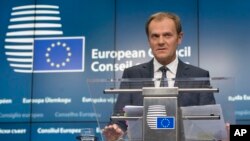It's a rare occasion when European Union leaders end a summit in just one day, but that's what happened Thursday when heads of state wrapped up their last big meeting of the year before midnight in Brussels.
A top item of discussion: the standoff with Russia over Ukraine. Months of European and U.S. sanctions against Russia over the Ukraine crisis appear to have taken their toll.
But are they enough? For the new head of the EU, former Polish Prime Minister Donald Tusk, the answer is "no." He believes the 28-member bloc needs to forge a long-term strategy in dealing with Russia.
Earlier in the day, the EU agreed to toughen sanctions against Crimea, which Russia annexed in March. But the bloc is holding off — for now — on piling on new punitive measures against Moscow.
Speaking to reporters after the summit, British Prime Minister David Cameron said the EU leaders unanimously agreed to keep in place the existing sanctions against Moscow.
"As I've always said, the door is always open. If Russia changes its behavior, if it allows the Ukrainian people to exercise their choice and their sovereignty and decide their future, if it takes Russian troops out of Ukraine and obeys all the strictures of the Minsk agreement, these sanctions can go [be lifted], but until that happens, these sanctions shouldn't go," he said.
The standoff over Ukraine has plunged relations between Europe and Russia to lows not seen in years. The sanctions, along with falling oil prices, are taking their toll on Russia. But today, EU President Donald Tusk believes it is time to take a longer view when it comes to ties with Moscow.
"When I declare that we need something more than immediate reactions, I mean that Europe really needs a united strategy toward Ukraine, but especially toward Russia," he said. "Because ... in fact Russia is our strategic problem. ... The biggest challenge in fact today is Russian approach — not only to Ukraine but also to European Union."
Tusk's remarks suggest a new European position on how to deal with Russia. He says the EU must be united and pragmatic, but the shape of any new European policy remains unclear.
Russia expert Anton Koslov of the American Graduate School in Paris believes Tusk wants the EU to become a more active and independent player when it comes to dealing with Russia.
Both sides, he says, share common political and economic interests, and that it's in the interest of both to find a consensual relationship.
"We're going to see what kind of relationship that's going to be," he said. "I think it's very difficult to talk about setting a strategic vision, because things may change. ... To define the EU's approach to Russia over the next 20 years, I think it's kind of complicated."
Kadri Liik, senior policy fellow at the European Council on Foreign Relations, says the EU and Russia have very different visions of the world and international order.
"Russia really sees the world in terms of spheres of influence and thinks it's entitled to its own — at the expense of its [neighboring] countries," he said. "And that's not the approach that Europe agrees with."
But turning a European vision of the world — and of Russia — into a European strategy is another matter.
The EU has long been challenged with crafting a common foreign policy. And that may be no different today, when it comes to Russia.




